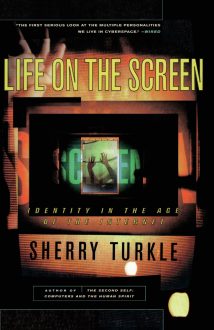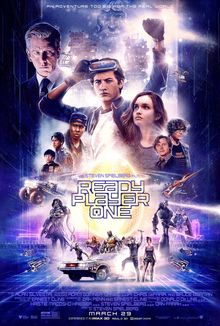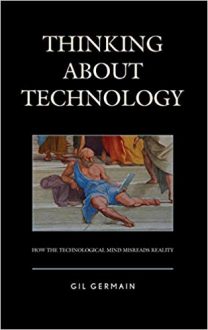
In a sense, the titular question, above, is redundant. Technology is, after all, already dominant — a claim that hardly needs to be substantiated with evidence; it is there for everyone to perceive on a daily basis. Not that the objects of ‘perception’ are self-evident in any straightforward way. In social reality a good deal of ideological ‘fantasy’ is subliminally integrated with what may seem to be simple acts of perception, as John Berger showed years ago in his deceptively simple little book, Ways of Seeing (1972), based on a television programme by the same name.
This is precisely why everyone readily observes the dominance of technology in everyday life — it has been so firmly established as the most pervasive ideology of the present, albeit in conjunction with neoliberal capitalism in a relationship of mutual dependence, that the perception of most people is from the outset conditioned by its pervasive ‘distribution of the sensible’.
I don’t have the space here to elaborate on the work of those thinkers who take the ideological dominance of technology seriously enough to devote penetrating critiques to it. I have written on some of them on this blogsite before here and here, but here I want to follow another route to stress the importance of approaching technology critically, namely noteworthy films.
There have been many important cinematic thematisations of the increasingly ubiquitous role of technology in societies worldwide. Some readers may recall Peter Weir’s The Truman Show (1998), with Jim Carrey in the title role of someone whose entire life is the subject of a widely popular reality television show, a fact of which he is blissfully unaware, until near the concluding, climactic moment in the film narrative, when Truman literally and figuratively leaves his familiar world behind to confront the unknown world outside the technically constructed ‘bubble’ in which he has lived until then.
Needless to say, the title of Weir’s film (The Truman Show) suggests that the ‘true man’ (and woman) of the present era is one whose entire life is artificial, and, adding insult to injury, that they (like Truman) are completely unaware of it. If this seems unreasonable, consider critical theorist Jean Baudrillard’s claim, that the technological society of the present has spawned a social condition where we live ‘simulated’ lives, that is, lives where we lack the criteria to distinguish between what is ‘real’ and what is technically produced as a simulation.
This is completely counter-intuitive, of course, because — as Baudrillard points out — there are many ruses to convince us that the distinction real/imaginary is intact. For example, the existence of theme parks like Disneyland, which celebrate imaginary worlds, seems to confirm this. Not so, says Baudrillard. Disneyland exists, he argues, in order to hide the fact that the whole of America (and one might add, the world) is Disneyland, that is, imaginary. And because the function of technology in the establishment of a facility like Disneyland is indispensable (and everywhere visible), of course, it is easy to see its connection with the ‘real’ world, which is also increasingly a technological construction.
If you are still not convinced, ask yourself the question – and here one hits ontological (being-related) rock-bottom regarding Baudrillard’s claims – which mode of your social existence you attribute most value, or give most credence, to: your daily, physical, embodied existence, or your online, social media-connected life. There is plenty of evidence that the consensus today rests with the latter, which (if true) means that most people live lives of simulation, where their electronically mediated actions (likes, dislikes and ‘friending’ or ‘unfriending’) are given priority over their embodied ‘real’ selves, to the point where their online existence attains the status of their ‘real’ lives.
In Life on the Screen (1995) Sherry Turkle lists several such instances uncovered by her research among internet users, while the documentary, Second Skin (2008) leaves no doubt that this is the case even in the unlikely context of MMO players immersing themselves so completely in online games such as World of Warcraft that they neglect their ‘real’ lives to the point of personal disaster.
The implications and dangers of simulation have been explored by several other films too, of course. Barry Levinson’s Wag the Dog (1997) examines the political risks accompanying the technologically mediated simulation of a war for the sake of a president’s re-election, exposing the immense power of media-technology in successfully ‘manufacturing’ a fictitious conflict in a ‘really’ existing foreign country.
Kathryn Bigelow’s neo-noir, Strange Days (1995), as well as Wim Wenders’s To the Ends of the World (1991), addresses the mesmerising effects of image-simulation, which is no longer confined to the world of cinema, of course. Wenders’s film focuses on the technical, intra-psychical reproduction of individuals’ dreams, which achieves the simulation of reality with such intensity that it displays serious addictive, pathologising effects. In Bigelow’s film this theme is pursued along similar techno-fictional lines, where one witnesses the effects of the (not yet actualised, but potentially) neuro-technologically induced simulation of one’s own, or even vicariously of her people’s experiences, with predictable consequences of addiction and perversion.
 A recent instance of cinema that takes the seductiveness as well as the dangers of simulation seriously, is Steven Spielberg’s Ready Player One (2018). The fictional software in the film narrative bears the telling name of Ontologically Anthropocentric Sensory Immersive Simulation, or OASIS. A roller-coaster story which depicts a future world where extant reality has become so unbearable that people (with access to the requisite 3-D technology) immerse themselves as frequently as possible in the 3-D simulations of cyberspace, Ready Player One nonetheless contains a subtle warning against mistaking simulated reality for all of reality. To this end, Spielberg cleverly employs the likely identification of audiences with the film’s two protagonists to bring the message across, that one has to take time out from the realm of simulation if you wish to retain your ability to function as an embodied human being – which has to be presupposed in the operation of the technological controls that give you access to 3-D reality-simulation, anyway.
A recent instance of cinema that takes the seductiveness as well as the dangers of simulation seriously, is Steven Spielberg’s Ready Player One (2018). The fictional software in the film narrative bears the telling name of Ontologically Anthropocentric Sensory Immersive Simulation, or OASIS. A roller-coaster story which depicts a future world where extant reality has become so unbearable that people (with access to the requisite 3-D technology) immerse themselves as frequently as possible in the 3-D simulations of cyberspace, Ready Player One nonetheless contains a subtle warning against mistaking simulated reality for all of reality. To this end, Spielberg cleverly employs the likely identification of audiences with the film’s two protagonists to bring the message across, that one has to take time out from the realm of simulation if you wish to retain your ability to function as an embodied human being – which has to be presupposed in the operation of the technological controls that give you access to 3-D reality-simulation, anyway.
Although these films represent serious probes of the phenomenon of simulation, they arguably beg the question implied by Baudrillard’s critique of technology, namely that contemporary culture has reached the point where it no longer makes sense to distinguish between simulated and ‘real’ events or phenomena, as these films still (have to) do, lest they forfeit their capacity to offer a critique of the respective simulation(s) in question.
 In his book, Thinking about Technology (2017) — that I discussed in my last post for ThoughtLeader — Gil Germain provides an excellent example of simulation, which is paradigmatic for the increasing effects of modern technology in our societies. He refers to a flight simulator, which lets one experience ‘flight’ so convincingly that it induces all the effects that accompany ‘real flying’, such as nausea for some people. In fact, he reminds one, the flight simulator is so convincing that it makes no sense to distinguish between that and the ‘real thing’ any longer, at least not in terms of the way one experiences either of them.
In his book, Thinking about Technology (2017) — that I discussed in my last post for ThoughtLeader — Gil Germain provides an excellent example of simulation, which is paradigmatic for the increasing effects of modern technology in our societies. He refers to a flight simulator, which lets one experience ‘flight’ so convincingly that it induces all the effects that accompany ‘real flying’, such as nausea for some people. In fact, he reminds one, the flight simulator is so convincing that it makes no sense to distinguish between that and the ‘real thing’ any longer, at least not in terms of the way one experiences either of them.
Hence the question I raise in the title of this post: Should one question technology’s drive for dominance? And by this I don’t only mean questioning it verbally, but in one’s actions, too, lest one should reach the point where even such questioning becomes impossible, because unthinkable. I, for one, believe that one should do so all the time — not to the point where one does not avail oneself of the comforts and pleasures of technology (such as viewing a film, or listening to music on a technical device), but to prevent the possibility of a totalising, fully integrated technological domain becoming an actuality, because if that should happen, there would be no more space for critique. The capacity for critique is what makes us human, after all.


